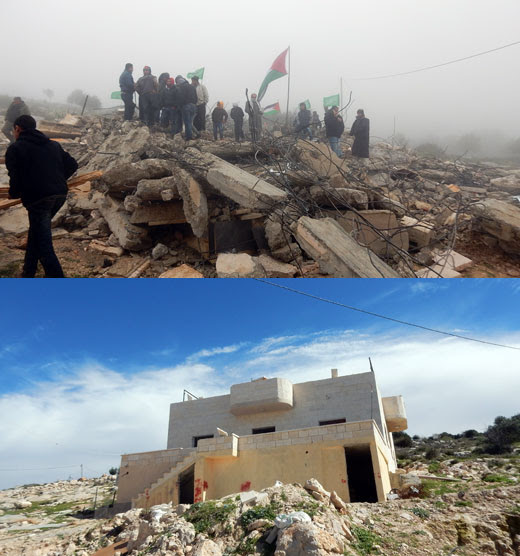Israel continues policy of collective punishment: Military punishes 15 people, incl. 9 minors, for their relatives’ actions, demolishing their homes
Published:
29 Feb 2016
Early on the morning of 23 February 2016, Israeli military forces came to the villages of Deir Samit and Dura in the Hebron District and demolished both an apartment belonging to the family of Muhammad al-Harub and the home of the Raed Khalil’s family. The demolitions were carried out by way of punishment for the involvement of the two men - who are in custody - in two attacks that killed four Israelis and one Palestinian. On 14 February 2016, the High Court of Justice (HCJ) denied the petitions filed by the families and HaMoked - Center for Defence of the Individual, and approved the demolitions.
 Al-Harub family home in Deir Samit after the demolition. Photo by Nasser Nawaj’ah, B’Tselem, 23 Feb. 2016
Al-Harub family home in Deir Samit after the demolition. Photo by Nasser Nawaj’ah, B’Tselem, 23 Feb. 2016
In Deir Samit, the military demolished the second story of a three-story building belonging to the family of Muhammad al-Harub. Al-Harub has been indicted for the attack in Gush Etzion on 19 November 2015, in which Ya’akov Don, Ezra Schwartz and Shadi ‘Arfah were killed. He has been remanded to custody for the duration of the legal proceedings. Al-Harub’s family says that prior to his arrest he had been living in an apartment on the first story of the building; his father and younger brothers in apartments on the second and third stories; and his older brothers and their families lived in additional apartments. On 30 December 2015, military officials informed the family that they plan to demolish the apartment on the second story, claiming that Muhammad al-Harub had lived in that apartment, rather than the one on the first floor. The HCJ denied the family’s petition, accepting the state’s argument that according to information provided by the Israel Security Agency (ISA) al-Harub had lived on the second story, and permitted the demolition of the apartment.
On 23 February 2016, large military forces arrived and demolished the exterior walls of the second story and some of its interior walls as well. The family says there were two apartments the second story and they are now unfit for habitation. The petition against the demolition which the family submitted to the HCJ noted that nine people, including four minors, lived in the two apartments.
In the village of Dura, the military demolished the home of Raed Khalil’s family. Khalil has been indicted for the attack in Tel Aviv on 19 November 2015 in which Aharon Yesayev and Reuven Aviram were killed, and remanded to custody for the duration of the legal proceedings. His wife Samaher Khalil and their five minor children lived in the home, which three rooms and a basement. The military forces demolished the house in its entirety.

Khalil family home in Dura - before and after demolition. Photos by Nasser Nawaj’ah, B’Tselem, 18 and 23 Feb. 2016
These demolitions by Israeli security forces rendered homeless 15 persons, including nine minors - none of whom were suspected or accused of any wrongdoing. Since October 2015, Israel has stepped up its use of home demolitions as a punitive measure. Including these latest demolitions, the total number of apartments demolished or sealedby the authorities since the beginning of October has now reached 31. This figure includes 14 apartments that were not even slated for demolition by the authorities, but were so badly damaged during the demolition of nearby homes they became unfit for habitation. In addition, in recent months security forces have surveyed dozens of homes belonging to the families of Palestinians who either perpetrated attacks or are suspected of perpetration or involvement in such attacks, with the intention of demolishing these homes in the future.
The justices of the HCJ have repeatedly sanctioned the state’s use of this measure, which is prohibited under international law and constitutes collective punishment. The HCJ has permitted Israeli authorities to pursue this course of action despite its severity and the clear position of jurists in Israel and abroad that it is unlawful. Petitions to the HCJ concerning home demolitions are based on a 1988 ruling of the HCJ itself. Further to a petition by the Association of Civil Rights in Israel (ACRI) it ruled that in cases concerning punitive demolition, authorities must allow families to turn to the court before demolition takes place. Since that ruling, however, the HCJ has denied almost all petitions on the matter, allowing the military to carry out the demolitions. Such conduct cannot pass for judicial review and is no more than lip service to the notion of judicial review.
هیچ نظری موجود نیست:
ارسال یک نظر